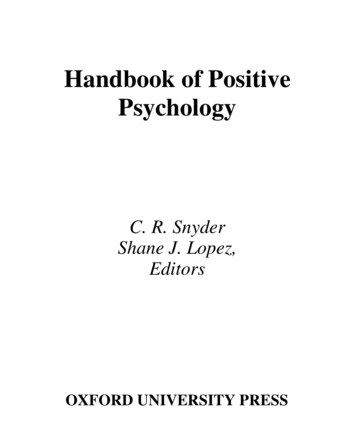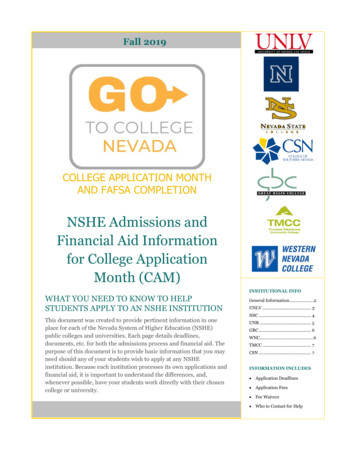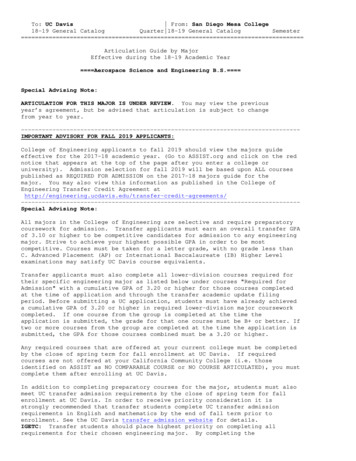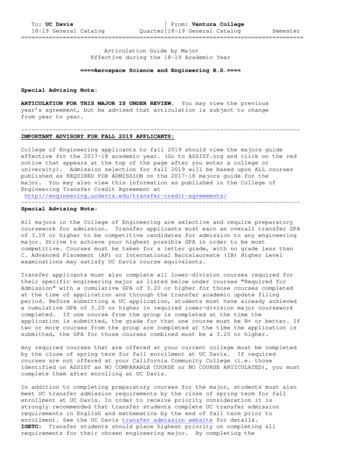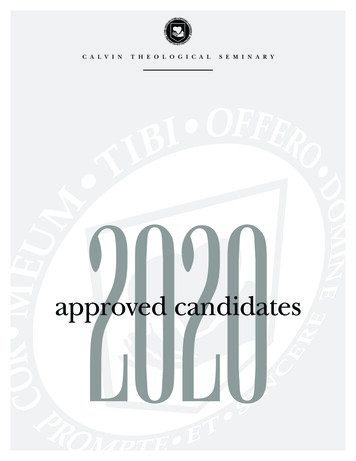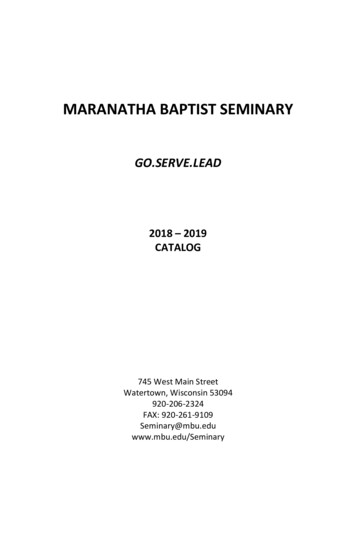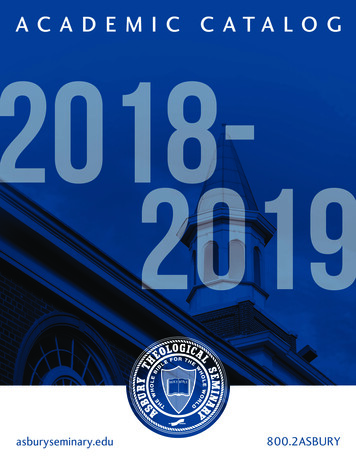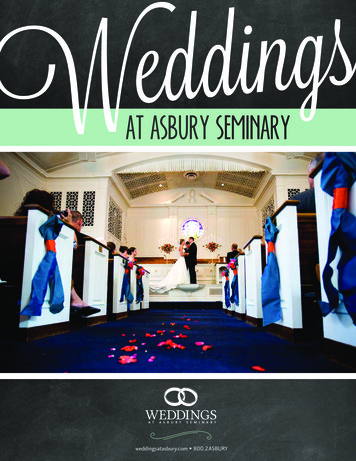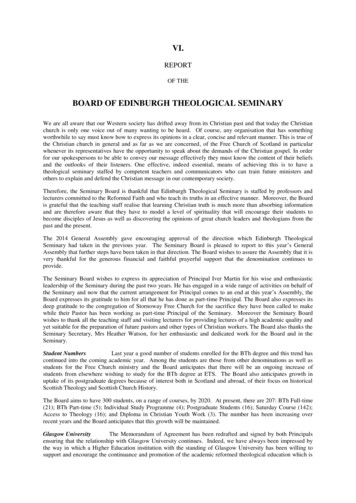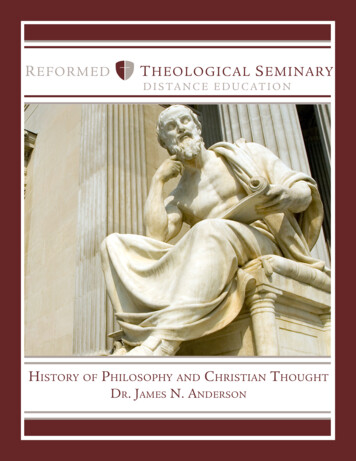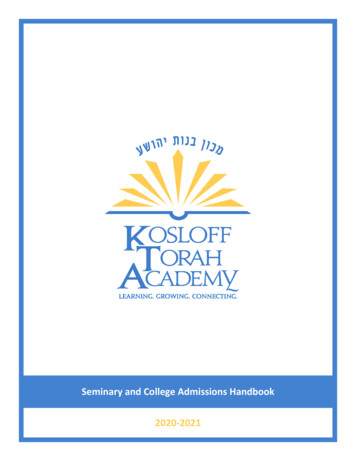
Transcription
Seminary and College Admissions Handbook2020-2021
TABLE OF CONTENTSThe Seminary Experience: A Guide for Students and Parent.1Seminary Application Timeline.2Seminaries in Israel.3Seminaries in the U.S., Canada and England.4Applying to Seminary.5Israel Option Programs. 6Financial Aid for Seminary.6Applying to College: A Guide for Students and Parents.7Timeline for College Admissions.9Standardized Testing.10Conversion Chart for ACT and SAT Scores.11Glossary of Financial Aid Terms.12Transcript Request Form.13Request for Recommendation for Seminary and College.14Student High School Resume Form.15
THE SEMINARY EXPERIENCE: A GUIDE FOR STUDENTS AND PARENTSKTA encourages families to seriously consider the option of a year of seminary education following high school.Seminary is a unique opportunity for a young woman to further her Jewish education, grow in ruchniyus, and solidifythe values and aspirations that will guide her throughout her life. For students who attend seminary programs inIsrael, there is the added dimension of developing a personal connection with Eretz Yisrael and drawing inspirationfrom the atmosphere there. We recognize, of course, that the Israel seminary experience is not necessarily the rightchoice for every student, and we respect and support each family’s decision making process.Selecting the seminary that is right for each student can be a challenge, particularly with the proliferation of programsin recent years. Seminaries tend to be relatively homogeneous and niche oriented, so it is important that the fitbetween the seminary, the student, and the student’s family be right. The KTA administration works closely witheach student to facilitate the seminary application process, but it is important for students and parents to do theirown objective research, as well, to ensure that the seminary year will be the truly enriching experience that it can andshould be.It’s helpful to begin by identifying goals for the seminary year. This is an important time for open, candid sharing andconversation between the student and her parents about respective goals, expectations, priorities and concerns.Once everyone is “on the same page,” the research can begin. Formulate your questions, and begin networking to geta better sense of the unique character of each seminary that you are considering. It is a good idea to gatherinformation from a variety of sources. It may be helpful to speak with recent seminary graduates, and with high schoolguidance professionals and teachers who know the student and/or her family. Seminary websites are a good source ofinformation, but be wary of blog sites, which are notoriously unreliable. Beginning in November and December, anumber of seminary directors typically visit KTA, and their presentations are usually enlightening for our students andhelp them to refine their choices. Due to the COVID-19 restrictions globally, we do not expect many in-person visitsthis year. Instead, seminaries are creating virtual platforms to recruit, and we will share the relevant information withstudents as it becomes available.The following are questions that may help you distinguish among different seminaries:1. What is the seminary’s religious orientation and hashkafa?2. What is the student profile at the seminary? (Size of the student body? High schools which are major “feederschools?” Balance between “in town” and “out of town?”)3. What do the alumnae generally do after seminary? (Work? College? Shana Bet in Israel?)4. What is the seminary’s educational style? How much emphasis on text skills and text-based learning? How rigorous isthe class schedule and the workload? Is the teaching style primarily a traditional lecture format? Chavrusa learning?Independent study?5. What is the level of supervision (rules, expectations, curfew, dress code, security, etc.)?6. What is the overall atmosphere in the school and in the dorm?7. What are the policies regarding Shabbos, Yom Tov, and free time?8. In what city and neighborhood is the seminary located?9. What are the living accommodations? Are meals provided?10. What kind of transcript is issued, and where is it honored?11. Does the seminary participate in the Touro or Stern College Israel Option programs?12. What are the tuition and fees? Are scholarships available? Does the seminary participate in MASA?1
TIMELINE: SEMINARYADMISSIONSSENIOR YEARSEPTEMBER - OCTOBER Meet with Mrs. Biberfeld to discuss your goals and identify options Research schools to narrow down your choices Workshop for Parents: Financing Your Daughter’s Future Create a resume, using the KTA High School Student Resume template Draft a personal statement to accompany your applicationsNOVEMBER - DECEMBER FAFSA (Free Application for Federal Student Aid) process begins October 1 Request teacher recommendations well in advance of application deadlines Email Transcript Request Forms to Mrs. Bromberg (abromberg@ktahs.org) and Mrs. Biberfeld(rbiberfeld@ktahs.org) a minimum of three weeks prior to the application deadline. Submit a separate form foreach seminary to which a transcript must be sent. Download applications for seminaries with websites and/or online applications Applications for Bais Yaakov seminaries available from Mrs. Biberfeld Complete applications for 2-4 seminaries Applications due in December (check each seminary's materials for specific deadline)JANUARY - FEBRUARY Applications due (check each seminary’s materials for specific deadline) Seminary interviews scheduled and conducted Acceptance letters mailed in February by many seminaries (not Bais Yaakov or Chabad seminaries)MARCH Applications due February 15 for the Joint Israel Program, Stern College of Yeshiva University Chabad seminary applications due in February, interviews conducted in late February, acceptance lettersmailed in March Applications due in March for the Israel Option Program at Lander College for Women (Touro) Apply for the Morton Stein Scholarship, a needs-based scholarship for students attending OrthodoxJewish seminary programs in Israel. It is administered by the Federation of Jewish Agencies. Application andinformation available at 1/end-Morton-SteinApplication-2020.pdf Apply for MASA scholarship, sponsored by the Jewish Agency to enable American students to attend “gapyear” programs in Israel. Application and information at www.masaisrael.org Send deposit and confirmation of intention to attend to your chosen seminary. Thank other seminaries thathave accepted you. Notify and thank all those who wrote recommendations on your behalf.
SEMINARIES IN ISRAELThere are many seminaries in Israel, catering to a broad spectrum of student needs and interests.This list is certainly not exhaustive, but it does include the seminaries to which KTA students have applied in the past,as well as some newer schools which may be of interest.The list below is alphabetical by seminary name and indicates in parenthesis the seminary’s identification - Bais Yaakov(BY), Center of Spectrum (CS), Religious Zionist (RZ) or Chabad (CBD) - and the neighborhood in which it is located.Ateres Bnos Yerushalayim (BY, Ramot)BJJ-Bais Yaakov Yerushalayim (BY, Sorotzkin)Be’er Miriam (CS, Har Nof)Beit Chana (CBD, Tzfat)Bnos Avigail (BY, Har Nof)Bnos Batsheva (BY, Geula)Bnos Chava (BY, Har Nof)Bnos Sarah (BY, Har Nof)Bnot Torah/Sharfman’s (CS, Ramat Eshkol)Chemdas (BY, Sorotzkin)Darchei Binah (CS, Bayit v’Gan)Hadar (BY, Kiryat Belz)Kesser Chaya (BY, Kiryat Moshe)Machon Alte (CBD, Tzfat)Machon Bnos Yehuda-BYA (BY, Har Nof)Machon Maayan (RZ, Beit Shemesh)Machon Raaya (BY, Geula)Mesores Rochel (BY, Mekor Baruch)Me’ohr (BY, Beit HaKerem)Michlalah (CS, Bayit v’Gan)Michlelet Mevaseret Yerushalayim - MMY (RZ, Baka)Midreshet Amit (RZ, Gilo)Midreshet HaRovah (RZ, Old City Jerusalem)Midreshet Moriah (RZ, Sha’arei Zedek Hospital)Midreshet Tehillah (CS, Har Nof)Nachlas (BY, Shmuel HaNavi)Neimos (formerly Pninim, BY, Har Nof)Seminar Yerushalayim (BY, Bayit v’Gan)Shaalvim for Women (RZ, Malcha)Shoshanat Yerushalayim (CBD, Ramat Shlomo)Tehillas (BY, Shmuel HaNavi)Tiferet (RZ, Ramat Beit Shemesh)Tomer Devorah (CS, Sanhedria Murchevet)Torah V’Chesed (RZ, Netanya)3
AMERICAN, CANADIAN, AND EUROPEAN SEMINARIESBais Yaakov AcademyBrooklyn, NY718-339-4747 ext. 1187Binah InstituteBaltimore, MD410-602-9717Bnos ChaimLakewood, NJ732-730-7589Lakewood Teachers SeminaryLakewood, NJ732-730-1470MaalotBaltimore, MD410-358-3144Seminar L’Moros/Bais Yaakov IntensiveBrooklyn, NY718-851-2900The New Seminary (Rebbitzen Bulka)Brooklyn, Monsey and Lakewood718-769-8160Yavne Teachers’ CollegeCleveland, OH216-371-8566Bais Sara SchenirerManchester, England845-352-0985Beth Jacob Teachers’ SeminaryToronto, Canada416-256-7233Beth Jacob Teachers’ CollegeMontreal, Canada514-739-1001/1003Gateshead Jewish AcademyGateshead, England44-191-477-4449V’At Alis (The New York Seminary)Brooklyn, NY718-298-2600Ateres NavaBrooklyn, NY347-462-24454
APPLYING TO SEMINARYThe ApplicationBais Yaakov seminaries send application materials directly to the school. Students may apply online toCenter of Spectrum, Religious Zionist and Chabad seminaries, either directly thorough the Seminary website orthrough applytosem.org. In addition to the application form, most seminaries require an autobiographical essayand a set of two to six passport size pictures of the applicant. It is a good idea to prepare these in advance toalleviate last minute pressure. Mrs. Biberfeld is available to review and assist with student application essays.Letters of RecommendationLetters of recommendation are extremely influential in the seminary admissions process. Most seminaries requirea recommendation from the high school Principal and one or two additional teacher recommendations. The bestrecommendations come from teachers who know the student and can highlight her accomplishments and character traits.Teachers take the responsibility of writing student recommendations very seriously and devote a great deal of timeand thought to crafting recommendation letters that present the student in the best possible light. Students shouldbe mindful of this, and should ask for a recommendation well in advance of the deadline and in a respectful andappreciative manner. After asking the teacher in person, the student should email or give the teacher a completedRequest for Recommendation Form, accompanied by a completed High School Student Resume form. (Both formsmay be accessed on the Seminary and College Guidance page of the KTA website.) If the seminary has a specificRecommendation Form as part of its application, that form should also be given to the teacher, with the Studentinformation at the top of the form already completed.Students will be asked to indicate on the recommendation to waive their right to see recommendations that arewritten for them. We strongly encourage students to accept this waiver, as seminaries will give greater weight torecommendations that are confidential and cannot be shared with the student and her parents.All letters of recommendation should be submitted to the school office, so that a copy may be kept in the student’sfile. Recommendations are sent by the school office to the seminary along with the student’s transcript, except incases where the seminary uses an online recommendation system. In these cases, the student should give theseminary the teacher’s KTA email address, and the teacher will be contacted directly to upload a recommendation.High School Transcripts A separate Transcript Request Form must be completed for each seminary and college to which the student is applying.Forms should be emailed to Mrs. Bromberg (abromberg@ktahs.org) and to Mrs. Biberfeld (rbiberfeld@ktahs.org).Transcript Request Forms must be submitted at least four weeks prior to the application deadline in orderto ensure that the student’s transcripts and letters of recommendation will arrive on time.No transcripts or other application materials will be released from the school office unless a Transcript RequestForm is on file.5
ISRAEL OPTION PROGRAMSStern College for Women (Yeshiva University) and Lander College for Women (Touro College) offer Israel Optionprograms for students applying to seminaries in Israel. These programs enable a student to attend a seminary in Israelas an overseas student enrolled in an American college. Students who plan to attend either of these colleges afterseminary should consider enrolling in one the Israel Option program if the following benefits are applicable to them:1. Enrollment in these programs makes a student eligible for federal financial aid if her family qualifies financially.2. Students in an Israel Option Program will automatically receive college credit for their seminary coursework,and those credits will be listed on the college transcript of the college whose Israel Option program the studentjoined. This is true only if the student actually attends that college after seminary.A student who wishes to attend seminary in Israel through one of these programs must complete a regular applicationfor the college, indicating on the application that she is applying for the Israel Option. She must make sure that theseminaries to which she is applying in Israel are on the college’s approved list. In addition to the college applicationfee, there is a non-refundable fee for participation in these programs.FINANCIAL AID FOR SEMINARYAs seminary education in Israel has become increasingly costly, many families are seeking ways to reduce the financialburden. One option is to consider American seminaries, which are less expensive and do not incur the additionaltravel expenses of study in Israel. Some Israeli seminaries do provide financial aid for students who can demonstrateneed, and many offer tuition incentives for students whom they especially hope to attract to their schools.There are a number of private sources of financial aid, including MASA grants (www.masaisrael.org)and the Morton Stein Scholarship of the Jewish Federation of In addition, students who plan to attend seminary in Israel through the Israel Option programs of Stern College orTouro College are eligible to apply for federal grants and loans. This requires completing the FAFSA form (www.fafsa.ed.gov), which becomes available online on October 1. For more information, see the section on College FinancialAid on page 15 of this handbook.6
APPLYING TO COLLEGE: A GUIDE FOR STUDENTS AND PARENTSPreparation for college begins long before the actual application process. Throughout high school, it is importantfor students to take challenging courses in the full range of academic subjects. Critical reading and writing skills areparticularly important, and the more a student reads – for pleasure as well as for school – the better prepared she willbe for standardized tests and college level work. High school is also a time to develop leadership skills, to discover andnurture personal interests through a variety of extracurricular activities, and to form close mentoring relationshipswith teachers. All of these involvements are of intrinsic value as well as being investments in the future which willbear fruit once the college application process formally begins.Each student follows her own individual path after high school, and there are many options available to enable astudent to achieve her personal, professional and academic goals. These include:1. Secular four-year colleges and universitiesThese include state universities and private colleges and universities, and run a wide gamut in terms of cost,breadth of offerings, competitiveness of the admissions process, and quality of Jewish life on campus. As ageneral rule, these schools offer no credit or a small number of credits for a year spent in seminary.2. Four year colleges under Orthodox Jewish auspicesLander College for Women (Touro College) has a residential campus in Manhattan and a commuter program inBrooklyn. Stern College for Women (Yeshiva University) has a residential campus in Midtown Manhattan. Theseare women’s colleges in which students are required to take some Limudei Kodesh courses along with theircollege courses. These schools offer a full year of college credit for a year spent in a seminary that is on theirapproved list. This enables students to complete an undergraduate degree in three years or less.3. Community CollegesThese institutions grant a 2-year Associate degree and offer a low-cost option for students seeking to fulfillprerequisites for professional training. Many students take courses at community college with the intention ofeventually transferring into four-year undergraduate programs. Most community colleges do not require SAT orACT scores.4. Online Degree ProgramsOnline degree programs are rapidly proliferating. Some are under the auspices of traditional universities, andothers are run by for-profit organizations. They can be a good option for students who are motivated and workwell independently, but please be aware that there have been many concerns about fraudulent practices in thissector, so do extensive research before selecting a program.5. Combined Seminary-College ProgramsCombined seminary-college programs usually involve a combination of online courses, CLEP exams and actualclassroom based courses. Seminary-college programs, such as Ma’a lot in Baltimore and Jerusalem, SarahSchenirer in Brooklyn and Lakewood, The New Seminary (Rebbitzen Bulka) in New York and Lakewood, and thenewest entry into this field, Fairleigh Dickinson University (FDU) in NJ, are each affiliated with an accredited7
degree granting institution. In these programs, students generally can complete an undergraduate degree froman accredited college in one to two years.6. Career Training ProgramsCommunity colleges and other professional training programs offer Associate degrees and prepare students forcareers such as radiology
FAFSA (Free Application for Federal Student Aid) process begins October 1 Request teacher recommendations well in advance of application deadlines Email Transcript Request Forms to Mrs. Bromberg (abromberg@ktahs.org) and Mrs. Biberfeld (rbiberfeld@ktahs.org) a
